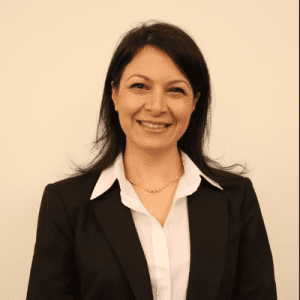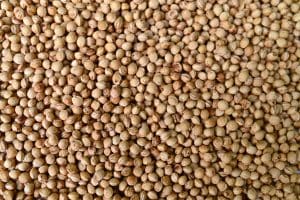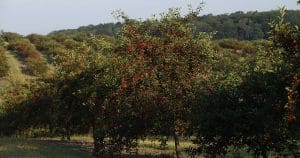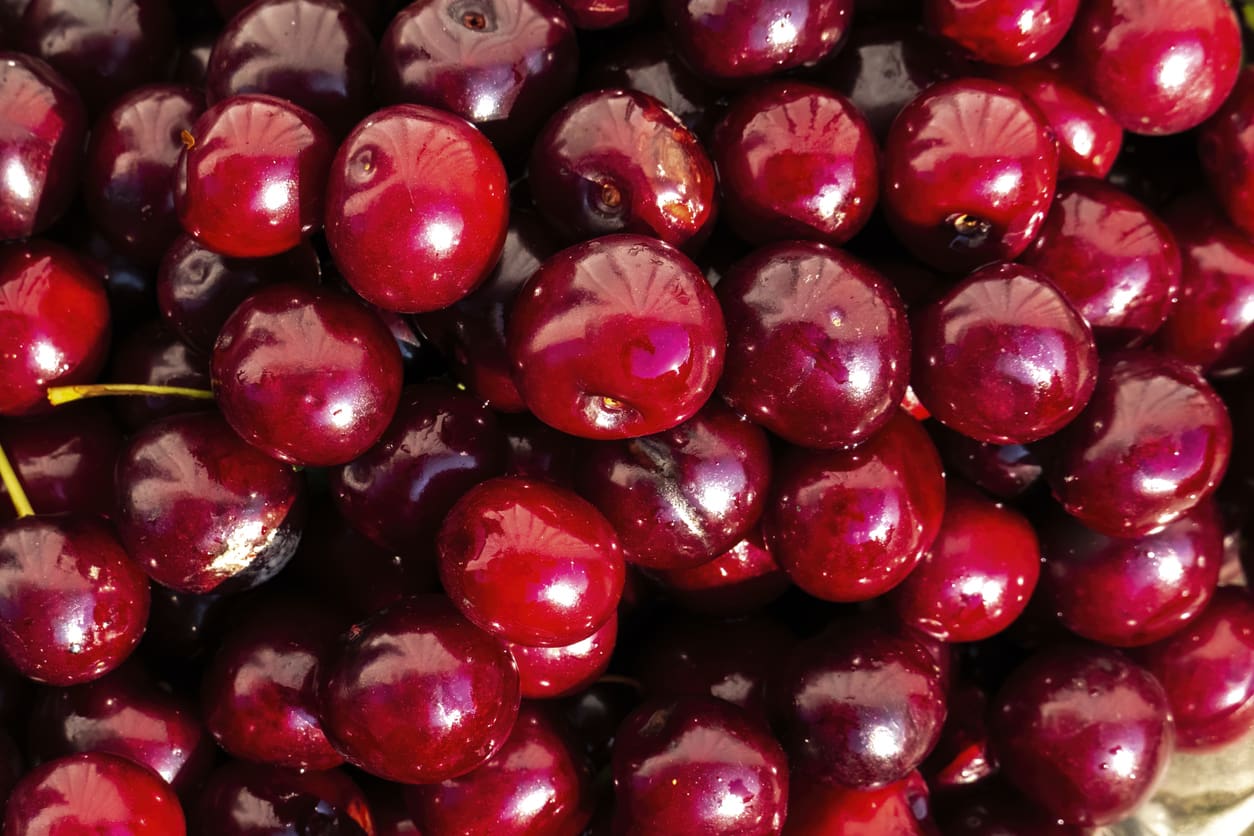
Although our farmers may feed the world, agriculture can also create waste byproducts that harm our environment. To help make farming a greener practice, Dr. Bahar Aliakbarian, an Associate Professor in the MSU Department of Biosystems and Agricultural Engineering and Director of Development and Research at the Axia Institute, is researching how the industry can repurpose agricultural waste to create usable products, including cosmetics and sustainable packaging, as part of her work with the Axia Institute. Founded in 2013 as part of MSU’s Office of Research and Innovation, the Axia Institute’s focus is on creating sustainable solutions for value chains, including Aliakbarian’s research in methods to up-cycle agricultural waste into value-add products.
“Just imagine, for example, the process of wine production or the process of cherry production. During the process, there are huge amounts of waste and byproducts produced,” described Aliakbarian. These byproducts can have a negative impact on the environment; as the organic components decompose, they generate greenhouse gas emissions such as CO2 or methane. “All of these solid or sometimes liquid byproducts come from the origin of the fruit or the origin of the vegetable,” said Aliakbarian, adding, “they can sometimes be repurposed, but they are also considered as waste and environmentally hazardous materials. So during the cultivation and processing of the cherries, in a short amount of time, you will have tons and tons of cherry pits, which are considered as byproducts.”, she explains.

One of the first challenges that Aliakbarian faces are that production plants often need to be made aware of any viable alternatives for their waste byproducts. Raising awareness among farmers and other food and supply chain stakeholders has been the first step toward improving agricultural sustainability. Aliakbarian is using her research to build awareness within the food and supply chain industries, training the farmers on how to reduce the production of byproducts in the first place and take the reduced byproduct to create and repurpose them into added value products.
Aliakbarian’s project concentrates on collecting agricultural waste and extracting bioactive components from these widely available and cheap byproducts to repurpose them into new products, which can be sold as an additional source of income for farmers. “For example, from the cherry pits, we are extracting antioxidants which have a lot of health benefits, and for the extraction, we are using only water and not organic solvents, so the entire process is green and environmentally friendly,” explained Aliakbarian. “And then, once the antioxidants are extracted from the cherry pits, they are then going to be used for different applications.”
One such application that Aliakbarian is exploring is to repurpose the waste as animal feed, as the repurposed antioxidants from the cherry pits hold anti-inflammatory and antibacterial properties as an additive in animal feed to improve the health of livestock. To research this application, Aliakbarian has partnered with MSU’s Department of Animal Science, working closely with Professor Barry Bradford. “The basic concept is that we are trying to find feed additives that will make animals more resilient in terms of health,” Bradford described. “Part of the idea is to provide antioxidants, something like the sort vitamins provide, to have an influence on the bacteria in the gut,” he continued. “There are different ways that these byproducts might help for animal health, but there is a lot of interest in this, particularly because of the increase in pressure to reduce the use of antibiotics to maintain health in livestock.” Therefore, Bradford and his team are testing these byproducts to help them identify the most promising extract.
Aliakbarian has received multiple grants for her research, including a grant from the Michigan Translational Research and Commercialization (MTRAC) program, which is focused on the animal feed applications of her research. She is also in discussion with Natural Biologics and Cargill, two big names in the animal feed industry. “Our hope is, if we can find the right partners and the right funding, that we can take this to an initial animal model in the next year or two,” exclaimed Bradford. “If we can make this work, I think it would be pretty neat as we are taking a waste stream from one product of agriculture and using it to solve problems in another part of agriculture, particularly if we can do it all on a regional basis in Michigan.”
Aliakbarian has also been investigating the effects of the antioxidants derived from agricultural byproducts on different cell types, such as the human skin cell keratinocytes, to see if they have any anti-aging properties for use in the cosmetics industry. For her research applications in cosmetology, Aliakbarian has received a Target Support Grant for Technology Development (TSGTD) and is working with an industry partner based in Florida called Earth Supplied Products (ESP).
ESP is an international company that provides natural-based active ingredients to cosmetic companies, with one of their most prominent collaborators being L’Oreal. Because of this, Aliakbarian is in conversation with L’Oreal, sending them samples that she extracted in the lab, allowing them to do some visibility testing for the cream formulation she made. Although L’Oreal hasn’t licensed her project yet, Aliakbarian is optimistic about the results and believes a viable product will make it to market.
Aliakbarian is also researching how to use these recycled agricultural byproducts in the food packaging industry. For example, with certain byproducts, Aliakbarian is working to make something called ‘active packaging,’ a type of packaging with antibacterial properties derived from the byproducts. This kind of sustainable packaging reduces the growth of food pathogens during the conservation process, helping to increase the shelf life of fresh fruits and vegetables.
Since completing her Ph.D. in Italy, Aliakbarian has worked globally in a variety of agricultural sectors, such as grapes and olives, and most recently with crops commonly grown in Michigan, including cherries and apples. The research is flexible, Aliakbarian noted, meaning she can study any byproducts she wishes based on their region or the season. “For example, cherries have a season that is completely different to apples, and apples are completely different to carrots, but all of these processes generate solid byproducts that I can use for my research,” she explained.

Currently, Aliakbarian is in partnership with Shoreline Fruit, a cherry production company, and Black Star Farms, a winery in Traverse City, to provide her with the local byproducts she needs for her research.
Aliakbarian believes her research stands out because of its interdisciplinary characteristics and flexibility. “I am collaborating with different disciplines and also different industries. My research can use different types of byproducts, and then there is also the sustainability aspect, which is now a hot topic,” stated Aliakbarian.
One of Aliakbarian’s research partners, Bradford, described her work as “an example of the type of project that comes about being at a big research-heavy university,” adding “you never know what people might come out of the woodwork that have overlapping interests,” he said. “It has been a really great project, and Dr. Aliakbarian is a lot of fun to work with. We hope we can cross all the hurdles and someday end up with a product that is available on the market.”
Aliakbarian is helping to reduce the agricultural industry’s environmental impact while also finding ways for them to repurpose what was once a waste byproduct into another potential revenue stream. “In this case, we can also generate some sort of revenue for the small farmers or the small processing plants, which can sell these byproducts to other companies in order to be used,” she exclaimed. “This is why my research is a dual process; it has both the economic and environmental aspects of sustainability.”
About the MSU Innovation Center:
The MSU Innovation Center is dedicated to fostering innovation, research commercialization, and entrepreneurial activities from the research and discovery happening across our campus every day. We act as the primary interface for researchers aiming to see their research applied to solving real-world problems and making the world a better place to live. We aim to empower faculty, researchers, and students within our community of scholars by providing them with the knowledge, skills, and opportunities to bring their discoveries to the forefront.
Through strategic collaborations with the private sector, we aim to amplify the impact of faculty research and drive economic growth while positively impacting society. We foster mutually beneficial, long-term relationships with the private sector through corporate-sponsored research collaborations, technology licensing discussions, and support for faculty entrepreneurs to support the establishment of startup companies.
Are you interested in partnering with Dr. Bahar Aliakbarian to develop new ways to repurpose agricultural waste to create usable products? Contact Us!

